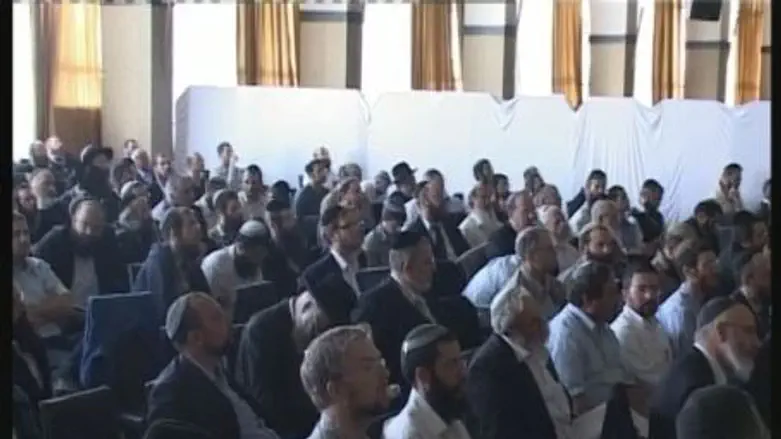
The PUAH Institute held on Wednesday its eleventh conference which dealt with doctors, rabbis, and the connection between the two. This year the conference was dedicated to the memory of the late Sephardi Chief Rabbi, Rav Mordechai Eliyahu, who was the spiritual and halakhic [Jewish legal] mentor of the institute and passed away this past June.
Since its establishment in 1990, PUAH Institute has helped thousands of couples suffering from infertility. The organization deals with fertility issues in a halakhic framework in a frank, warm, friendly and highly professional manner, focusing on making couples feel cared about and providing real breakthroughs. PUAH Institute combines caring about women’s emotional and physical state with care for the wellbeing of the couple.
Rabbi Gideon Weizman, head of the English Department of the PUAH Institute, told Israel National News TV that the organization’s annual conference, usually attended by close to 2,000 men and women, is the pinnacle of the work of the PUAH Institute throughout the year. Renowned rabbis such as Rabbi Dov Lior of Kiryat Arba, Dayan Rabbi Shlomo Daichovsky, Rabbi YIsrael Meir Lau, the current Chief Rabbis and others share the podium with heads of obstetrics, endocrinology, women's health and other major hospital departments and research institutes on a large variety of related issues.
“I think that in a very clear way the medical side and the halakhic side not only do not contradict each other but in fact they complement each other,” said Rabbi Weizman.
Dr. Shai Elitzur, IVF Unit Director at the Assuta Hospital in Tel Aviv, said that the connection which PUAH promotes between doctors and rabbis is “extremely important. The couple seeks our medical advice but they also seek the advice of the rabbis. It’s very important that we and the rabbis work together and understand each other’s abilities and views, and then we can give the couple the best advice to fit all their needs.”
“We have learned how to deal with the doctors; they’ve learned how to deal with us. We’ve learned how to accept each other,” said Rabbi Weizman. “We’ve also learned how to work together because really it’s about creating relationships. The doctors understand that we’re on the same side. We’re not doctors, we don’t give medical advice per se but we give medical direction that informs couples about new treatments. All of us are able to get them to relate to their doctors. Sometimes a doctor doesn’t know how to speak to a religious couple, that’s where we come in.”
Dr. Elitzur noted that in terms of fertility and reproduction, Jewish Law is the most advanced and modern law compared to other religions. Rabbi Weizman noted that the situation in Israel in terms of treatments for infertility is excellent, since treatments are covered by the national health insurance. “The availability of this treatment [in Israel] is really giving us incredible advances," he said. “Israel is very much a central and an important part of the fertility community around the world.”
The rabbis, he said, attend conferences, keep up with literature, and are in contact with experts and rabbis from around the world in order to be up-to-date on the latest information. Another important role the rabbis play is helping couples overcome their embarrassment and explaining to them what treatments are available and that treatment for infertility is halakhically permitted and encouraged. The late Rabbi Mordechai Eliyahu, the halakhic guide for the institute, held that the woman who actually gives birth is the halakhic mother of a child, paving the way for certain fertility procedures.
Among the rabbis who spoke at Wednesday’s conference was Rabbi Yisrael Ariel of the Temple Institute, who gave a PowerPoint presentation on women's role in the Holy Temple, showing that they took active part in bringing Passover and other sacrifices, the seder meal, and first fruits, and had a special balcony for watching Sukkot celebrations so that they could rejoice as well.
Rabbi Yoel Katan of Shaalvim Yeshiva, who has written halakhic papers on fertility issues together with his obstetrician-gynecologist. wife, Dr. Chana Katan, spoke about the use of elective artificial insemination in halakha and of its possible use to allow a person categorized as a “mamzer” (the offspring of a halakhically forbidden relationship such as incest which continues for several generations) to have children who are not categorized as such halakhically. Other rabbis disagreed with this interpretation, leading to a lively discussion that ended the conference.
PUAH Institute's informative website is http://www.puahonline.org/